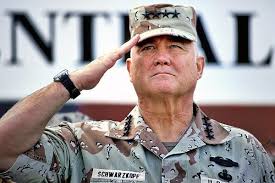Norman Schwarzkopf
 | |
| Born | 22 August 1934 Trenton, New Jersey, U.S. |
| Died | 2012-12-27 (Age 78) Tampa, Florida, U.S. |
| Nationality | US |
| Alma mater | • United States Army Infantry School • University of Southern California • West Point • Command and General Staff College |
| Spouse | Brenda |
| Member of | Le Cercle |
| Relatives | Norman Schwarzkopf Sr. |
Herbert Norman Schwarzkopf Jr. was a United States Army general. While serving as the commander of United States Central Command, he led all coalition forces in the Gulf War in 1990-91.
Assuming command of United States Central Command in 1988, Schwarzkopf was called on to respond to the invasion of Kuwait in 1990 by the forces of Ba'athist Iraq under Saddam Hussein. Officially tasked with defending Saudi Arabia from Iraqi aggression, Schwarzkopf's command eventually grew to an international force of over 750,000 troops. He planned and led Operation Desert Storm, an extended air campaign followed by a highly successful 100-hour ground offensive, which defeated the Iraqi Army and took back Kuwait in early 1991.
Contents
Father was spook
His father, the eponymous Norman Schwarzkopf Sr., had headed the newly formed New Jersey State Police and organized the state police to combat narcotics and prohibition era moonshiners. In 1932, Schwarzkopf Sr. became responsible for the investigation into the Lindbergh kidnapping, the kidnapping of Charles Lindbergh's 20-month-old son.
During the war, he was active in security work in Iran. Before he retired from the Army in 1953 with the rank of major general, Schwarzkopf Sr. was sent by the Central Intelligence Agency to help in Operation Ajax, the regime change against the democratically elected Prime Minister Mohammad Mosaddegh, in support of the Shah. The security forces Schwarzkopf Sr. he had trained to support the Shah would later become known as the incredibly brutal SAVAK secret police.
Military Career
Norman grew up in the United States and later in Iran. He was accepted by the United States Military Academy and was commissioned as a second lieutenant in the United States Army in 1956.
He was promoted to first lieutenant in 1958. In July 1959, Schwarzkopf was assigned his first overseas assignment; as a staff officer alternating with duties as a platoon leader, liaison officer, and reconnaissance platoon leader with the 6th Infantry Regiment in West Germany. In July 1960, Schwarzkopf was assigned as aide-de-camp to Brigadier General Charles Johnson, who commanded the Berlin Brigade in West Berlin.
In the Vietnam War, Schwarzkopf served as a task force adviser to the Army of the Republic of Vietnam Airborne Division from 1965.
After ten months of combat duty, Schwarzkopf was pulled from the front by MACV and reassigned as senior staff adviser for civil affairs to the ARVN Airborne Division. Then, he returned to the United States and finished his teaching assignment at West Point, where he was an associate professor in the Department of Mechanics. In 1968, he attended the Army's Command and General Staff College at Fort Leavenworth, Kansas, before returning to Vietnam.
In July 1978, Schwarzkopf became deputy director of plans at the U.S. Pacific Command in Hawaii. He then served a two-year stint as assistant division commander of the 8th Infantry Division (Mechanized) in West-Germany.
On October 25, 1983, Schwarzkopf was appointed to the command group for the Invasion of Grenada, where he was the chief army adviser to the overall operation commander, Vice Admiral Joseph Metcalf III.
In November 1988, Schwarzkopf was named commander of United States Central Command (CENTCOM), succeeding General George B. Crist.
In early 1990, he drafted a war plan, Operations Plan 1002-90, titled "Defense of the Arabian Peninsula," which envisioned an Iraqi invasion of Saudi Arabia through Kuwait.[1]
During CENTCOM military exercises in July 1990, termed Internal Look '90, Schwarzkopf wrote up a scenario that tested how the command would respond to a regional dictator invading a neighboring country and threatening oilfields there.[2] One week after the end of the exercises, Iraq invaded Kuwait on August 2, 1990.[3]
Deep political connections
An attendee of Le Cercle.
Event Participated in
| Event | Start | End | Location(s) | Description |
|---|---|---|---|---|
| Le Cercle/1990 (Oman) | 30 November 1990 | 30 November 1990 | Oman Al Bustan Hotel & Al-Baraka Palace Muscat | Start/End dates uncertain |